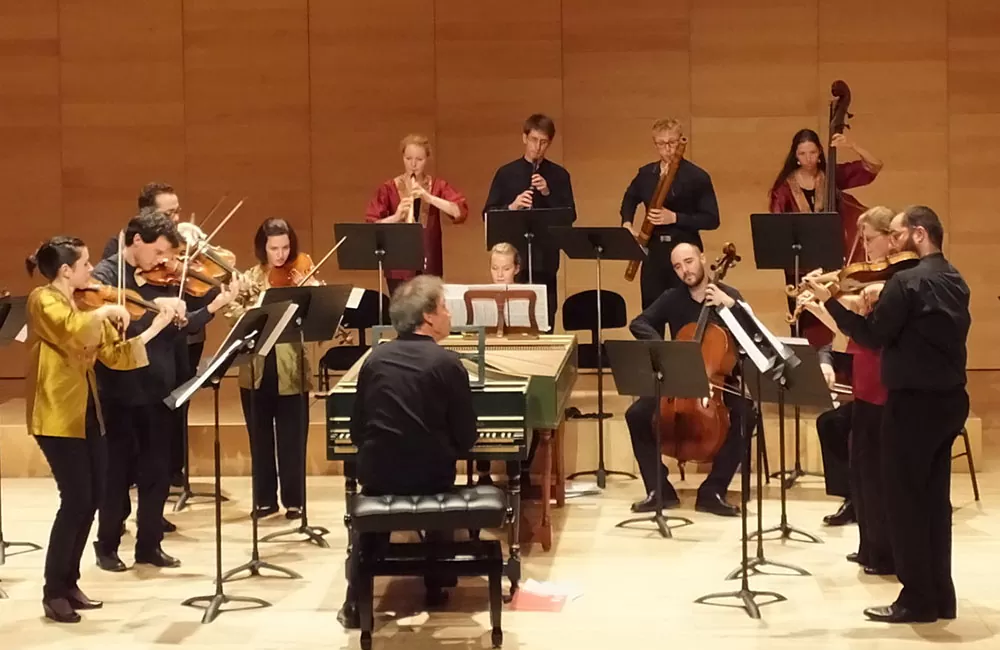Paul James is the driving force, heart and soul behind EUBO, the extraordinary European Union Baroque Orchestra, relaunched under the Icons Foundation in 2022. He is the visionary who founded the orchestra in 1985 and alongside Emma Wilkinson, guided it for over 30 years. Even now, Paul James continues to play a vital role in the orchestra’s ongoing journey as an artistic advisor. Our conversation with him shines a light on the backstory of this inspiring youth initiative.
A conversation with visionary founder Paul James


Part II: Key moments and takeaways for musicians
Continuing our interview with Paul James, in this second part, we reflect on the key moments in EUBO’s history and discuss the profound impact and significance membership has had on numerous baroque musicians.
Mr Paul James, how has EUBO developed over the years? What do you think have been the biggest milestones in 40 years?
I think a lot changed with the enlargement of the European Union in 2004.We suddenly went from about 12 countries to more than 20 almost overnight in May 2004. So that changed the nature of the direction a little bit, and then we started looking more into the Eastern European countries and so on, which changed the complexion of the orchestra a little bit.

I think we found a very good formula in the early days, in the late 80s, which we refined and developed a bit. Our formula allowed the students who were playing to have a very concentrated sort of five sections a year with us and also gave them time to continue their work at home. You know, some of them were married with little babies, and some of them had teaching jobs that they had to put off for two weeks each time they were with us.
Are there one or two concerts that stand out for you as being more memorable than the others?
Particularly given the situation we’re in now, one of the most interesting things we did was to go to Palestine, specifically the occupied territories of Gaza and Ramallah, in the late 90s. The European Union was very keen to try and do some sort of outreach in those more troubled parts of the world. I think we were certainly the first baroque orchestra ever to visit Ramallah or Gaza, and we were in Gaza for about a week, which was a real eye-opener for all of us. We had three Jewish people in the orchestra who were, I think, absolutely shocked by what was going on.
Another one of a similar nature, I suppose, was when we went to South Africa. Again, we were sponsored by the European Union and we performed in Soweto at a time when there was still quite a lot of conflict and tension in South Africa. So those two tours were particularly memorable.
But among all the others we did some incredible concerts at big festivals and we went to the Concertgebouw in Amsterdam quite often and other wonderful places like that.
In 40 years, many musicians have joined EUBO at the beginning of their careers. How have you seen musicians’ careers develop after joining EUBO?
I think we’ve had almost 2000 full-time members over the years. Now, when I travel, I see former EUBO members in all the major baroque orchestras, which is of course absolutely wonderful. It feels like we created a kind of family atmosphere with the orchestra, keeping in touch with most of them when they left. And apart from the fact that every baroque orchestra in the world has some former EUBO members in it, there are also many who are even leading orchestras, such as the Seville Orchestra, the Irish Baroque Orchestra and Holland Baroque among others. Other EUBO musicians have gone on to work at festivals, which is good, of course.
Do you think that EUBO has had an impact on the landscape of period instrument ensembles?
Absolutely. I would definitely say that it has encouraged and supported and helped a lot of young players to take that step into the professional world, which they might not have had the confidence to do otherwise. I mean, we’ve had several small ensembles that have come out of the orchestra members getting to know each other, and actually a couple of orchestras have come out of it. They were, I would say, quite short-lived, apart from Holland Baroque perhaps, which of course is going from strength to strength. There was one called Harmony of Nations and they just found it too complicated to run an orchestra with people living in 26 different countries. It was a practical thing, not a musical thing. Among the people who have come through, probably one of our most famous former members is Rachel Podger, who is now a baroque superstar and runs her own group, Brecon Baroque, which I think consists of 90 % ex-EUBO players.
This is part two of our conversation with Paul James. If you missed the first part, you can follow the below link. And keep an eye out for what’s next..

